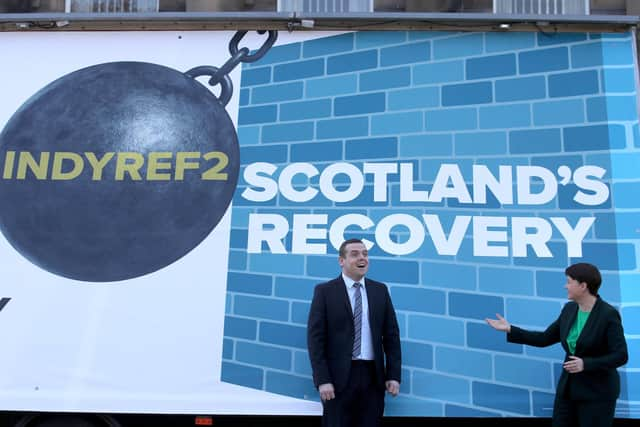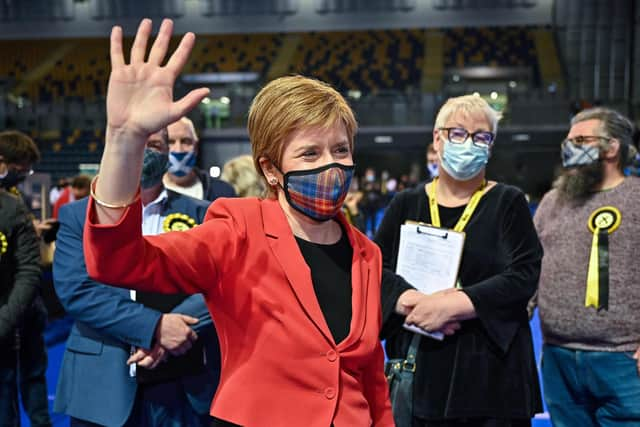Scottish election 2021: SNP now has mandate for independence referendum. Unionists need to start preparing their arguments – Kirsty Strickland
The votes have been counted and the results are in. In a historic election with a voter turnout that confounded expectations, the SNP has won a fourth consecutive term in power.
Together with the Greens, they have secured a clear pro-independence majority of MSPs at Holyrood.
Advertisement
Hide AdAdvertisement
Hide AdThe SNP fought a campaign that included a promise to hold another referendum when we’re through the Covid crisis. Nicola Sturgeon said she believed that should happen in the first half of the next parliamentary term. Nicola Sturgeon will once again be sworn in as First Minister.
With the exception of the Scottish Greens, all of the other mainstream parties included their opposition to such a vote in the campaigns they fought. The Scottish Conservatives had “Stop indyref2” as their core commitment. It was on the front page of every leaflet and it was repeated ad nauseum by Scottish Tory leader Douglas Ross during interviews and TV debates.
Nicola Sturgeon said “vote for us and you’ll get indyref2 when the time is right”, Douglas Ross said “vote for us to stop indyref2”.
She won. He lost.


An emotional hurdle
And so, Scottish voters have made up their minds. In doing so, they have signed, sealed and delivered a democratic mandate to the next Scottish government to pursue a referendum on independence, subject to the approval of the Scottish Parliament.
When that will happen, how that will happen and whether Boris Johnson will permit that to happen is, for today, irrelevant.
When we’ve been stuck as we have been, debating the legitimacy of such a basic concept – of parties putting forward a prospectus and voters casting their verdict on it – we need to scale this emotional hurdle before we can move onto what comes next.


Throughout the election campaign, Scottish Conservative leader Douglas Ross was asked some key questions that he was either unable or unwilling to give an answer to.
He was asked whether the Union is voluntary. He was also asked to explain the democratic route to Scotland being granted another independence referendum from the UK government.
Advertisement
Hide AdAdvertisement
Hide AdHis answers (and I paraphrase slightly) amounted to little more than “me, me, me”. Mr Ross said he didn’t want another referendum. That he didn’t think an independence referendum was in Scotland’s best interests.
Principled opposition
As a campaign strategy, it made sense. Evading those particular questions played well with his core support. He told them what they wanted to hear but still (and this bears repeating) he lost the election.
What happens next should be the subject of mature, good-faith discussions between the Scottish and UK governments. Douglas Ross should frankly consider himself lucky if he’s even allowed in the room.
That’s not to say that unionist politicians should now be expected to drop their principled opposition to independence any more than the SNP should have abandoned their core policy after the outcome of the 2014 referendum.
But to continue to obfuscate the outcome of election results and deny the right of the winning party to seek parliamentary approval for their manifesto commitments would be an act of vandalism on our democratic processes.
Since 2014, unionist parties have been unrelenting in their accusations that the SNP is a one-issue party and that they are “obsessed” with indyref2. Those claims may hold some weight but they can’t have it both ways. They can’t make those claims and then pretend that voters were too daft to realise what they were voting for when they put their cross next to the SNP logo.
Enough is enough. If we carry on as we have been since 2014, with every election campaign being dominated by the issue of indyref2 and the aftermath, the subject of tiresome debate about the apparent nuances of the result, then we’re trapped.
The “division” that unionist politicians like to warn against isn’t some far-off concept that will only be brought about if we embark on another referendum campaign. It’s here and now. It’s this endless, insincere whataboutery.
Tough questions on the economy
Advertisement
Hide AdAdvertisement
Hide AdPragmatic unionists should now start making the case for why they think Scotland would be better off remaining as part of the UK. That would be an infinitely more productive use of their time than rehashing an argument they have already lost about the legitimacy of voters having their say.
And when the time comes, the onus will be on any future Yes campaign to make the case for independence. They will have to answer the tough questions on the economy, currency and borders and win the trust of voters.
They will be starting in a much stronger position than last time around but the outcome is by no means certain – though the current 50/50 split is clearly a compelling enough reason for unionist parties to debase their democratic credentials over it.
What happens next will be the subject of debate and disagreement. But those discussions should not include deliberations about whether holding indyref2 is democratically acceptable. It is.
It is time for unionist politicians to engage with the political reality. We know that they would prefer not to have another independence referendum – they’ve made that abundantly clear.
On Thursday, they lost the argument. The good news for all political parties in Scotland, as well as the Scottish public, is that the debate to come will be infinitely more interesting than the one we’ve been subjected to for the last few years.
Scotland’s future will be decided by the people who live here.
That’s democracy. It’s messy, often inconvenient and the only certainty is that not everybody will be happy with the result. Democracy is all of those things, but it’s not divisive. But if unionist parties decide to ignore the outcome of this election, then that certainly would be.
A message from the Editor:
Thank you for reading this article. We're more reliant on your support than ever as the shift in consumer habits brought about by coronavirus impacts our advertisers.
If you haven't already, please consider supporting our trusted, fact-checked journalism by taking out a digital subscription.
Comments
Want to join the conversation? Please or to comment on this article.
